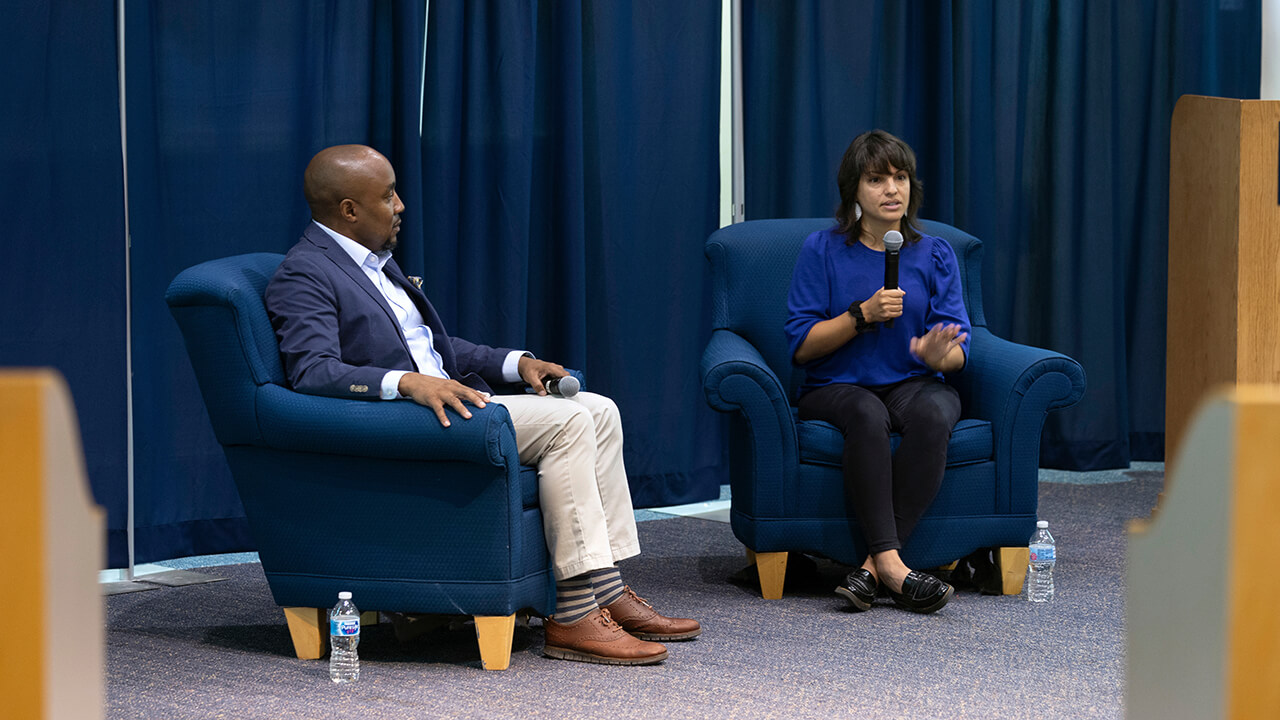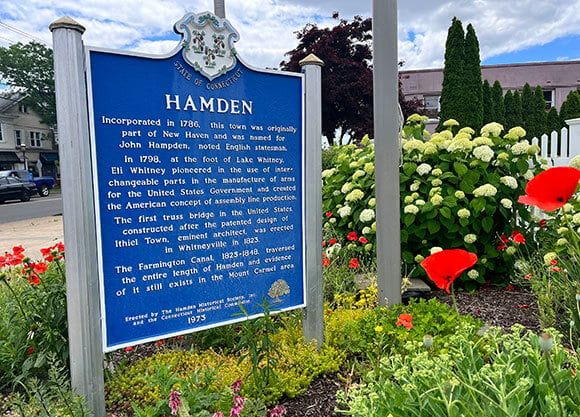
A journalist, entrepreneur and author of “I Never Thought of It That Way,” Guzman spent two days at Quinnipiac this week sharing her ideas for building new bridges and healing old wounds in America.
On Monday, every seat was taken in the Mount Carmel Auditorium to hear Guzmán's talk about "Critical Conversations." It was one part tent revival, one part master class in civility and humility. On Tuesday, she followed up with a provocative and illuminating workshop for faculty and staff.
“Politics today feels like it's exclusively about stopping the other side,” Guzmán said, calling out a country’s partisan warts. “But actually, politics is supposed to be about how we create societies that support all of us, in all of our differences.
“The American experiment, as imperfect as it has been, has also been amazing. We’ve made it this far,” Guzmán said proudly. “But to be able to continue to do this, we need to engage in the process. We need to visit — and revisit — how living in this world feels. Where do our norms and ideas and actions hit or miss the mark?”
The answers to those questions are for the relentlessly curious, Guzmán said, the people willing to listen and ask the questions that inspire dialogue, not shut it down.
It’s not about keeping score or shouting at those who don't think like you. It’s about dismissing the labels, stereotypes and generalizations that foster contempt rather than connection.
“The archvillain of curiosity is certainty,” Guzmán said flatly.
Politics and partisanship aren’t tone deaf in Guzmán’s world. As she mentioned several times during her talk: “People can’t hear unless they’re heard.”
The cover of Guzmán’s book also hints at the understanding inside. Above the title is the payoff of 238 pages: “How to Have Fearlessly Curious Conversations in Dangerously Divided Times.”
Given the opportunity, Guzmán said, the worst of human nature is empowered when partisan politics becomes corrosive and manipulative.
“It all comes down to whoever is underrepresented in your life will be overrepresented in your imagination,” Guzmán said. “And if we can’t as a democracy — a messy, promising, dangerous democracy — keep some bridges, we can’t check what’s in our imagination and what’s actually true. ... Get curious about each other with each other before it’s too late. For that to happen, we need to build some bridges.”
One person and one plank at a time.
While planks clearly build bridges, they also build party platforms. During the 2016 presidential campaign, then-Republican nominee Donald Trump ran on a plank to build a 30-foot high wall along the U.S.-Mexico border.
Guzmán’s parents, proud Mexican immigrants and U.S. citizens, were steadfast and unwavering in their support of the GOP standard-bearer. They voted for Trump in 2016 and again in 2020.
But the political dissension in Guzmán’s family started long before that. She remembers the day everything changed in painstaking detail.
“There was a day in the year 2000. I was in high school. We had just become American citizens, my family and I,” she said. “And I plopped my backpack down in the office at my house, and I looked up and I saw a Bush-Cheney sign over my mother’s desk. And my eyes just went wide.”
Suddenly, everything — and nothing — made sense. The fiery debates at the dining room table raged on. So did the intense political theater in the car. At one point, a good friend offered her this advice: “You know what I think? I think you have one job here. You either change your parents — or you forget them.”
Neither option was acceptable to Guzman. Her family’s love was unconditional, non-negotiable and off-limits.
It would’ve been easy to grab the nearest social flamethrower and torch the relationship with her parents. Instead, Guzmán learned to separate the views from the person. More importantly, she learned to listen and be curious.
But old habits die hard, especially when people and politics are demonized in America.
“One of the most pernicious ways we do this I found, particularly in these divided times, is when we assume that someone who opposes what we support must hate what we love,” Guzmán said.
Suddenly and intentionally at the lectern, Guzman’s applied the pronoun “they” to her teachable examples of this toxic partisanship.
“They wanted to defund the police when crime is up. They wanted to make it easier to buy guns when school shootings are on the rise," Guzmán said. “They must hate the need to be safe.
“They want to force me to carry a pregnancy I don't want. They want to inject a vaccine into my body that I don't trust,” she added. “They must hate my need to breathe.”
So what’s left, Guzman asked rhetorically.
“Rather than ask what people think about guns, abortion and the latest campus controversy, ask what concerns they have,” Guzmán said.
“And when they tell you those concerns, the follow-up question is, ‘Do you have any more?’ Then share your own concerns. Putting it all on the table gathers the knowledge that reveals the gas that gets your curiosity engine going before your judgment blinks.”
Stay in the Loop
Quinnipiac Today is your source for what's happening throughout #BobcatNation. Sign up for our weekly email newsletter to be among the first to know about news, events and members of our Bobcat family who are making a positive difference in our world.
Sign Up Now




























